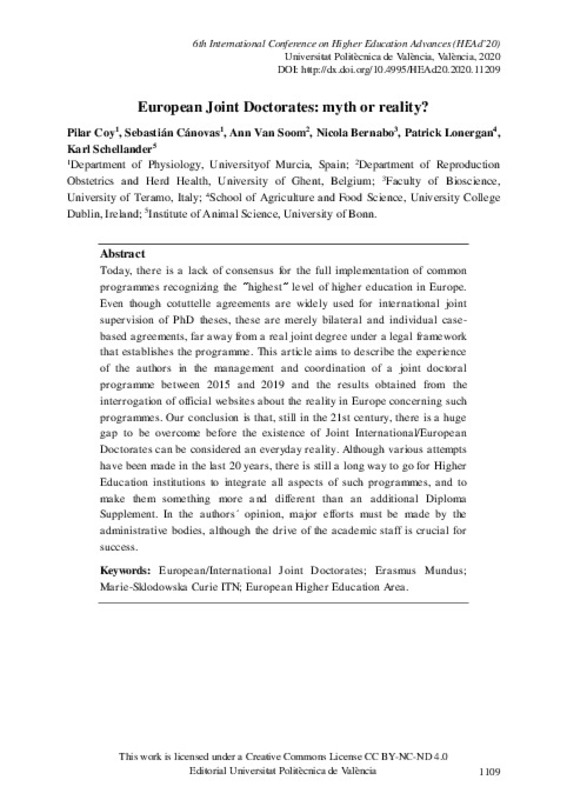JavaScript is disabled for your browser. Some features of this site may not work without it.
Buscar en RiuNet
Listar
Mi cuenta
Estadísticas
Ayuda RiuNet
Admin. UPV
European Joint Doctorates: myth or reality?
Mostrar el registro completo del ítem
Coy Fuster, P.; Canovas, S.; Van Soom, A.; Bernabo, N.; Lonergan, P.; Schellander, K. (2020). European Joint Doctorates: myth or reality?. En 6th International Conference on Higher Education Advances (HEAd'20). Editorial Universitat Politècnica de València. (30-05-2020):1109-1117. https://doi.org/10.4995/HEAd20.2020.11209
Por favor, use este identificador para citar o enlazar este ítem: http://hdl.handle.net/10251/145937
Ficheros en el ítem
Metadatos del ítem
| Título: | European Joint Doctorates: myth or reality? | |
| Autor: | Canovas, Sebastian Van Soom, Ann Bernabo, Nicola Lonergan, Patrick Schellander, Karl | |
| Fecha difusión: |
|
|
| Resumen: |
Today, there is a lack of consensus for the full implementation of common programmes recognizing the “highest” level of higher education in Europe. Even though cotuttelle agreements are widely used for international joint ...[+]
[ES] Today, there is a lack of consensus for the full implementation of common programmes recognizing the “highest” level of higher education in Europe. Even though cotuttelle agreements are widely used for international ...[+]
|
|
| Palabras clave: |
|
|
| Derechos de uso: | Reconocimiento - No comercial - Sin obra derivada (by-nc-nd) | |
| ISBN: |
|
|
| Fuente: |
|
|
| DOI: |
|
|
| Editorial: |
|
|
| Versión del editor: | http://ocs.editorial.upv.es/index.php/HEAD/HEAd20/paper/view/11209 | |
| Título del congreso: |
|
|
| Lugar del congreso: |
|
|
| Fecha congreso: |
|
|
| Tipo: |
|









